Expectation and the Experience of Aging: A Compelling Connection
Portrait of an Old Woman, 1880
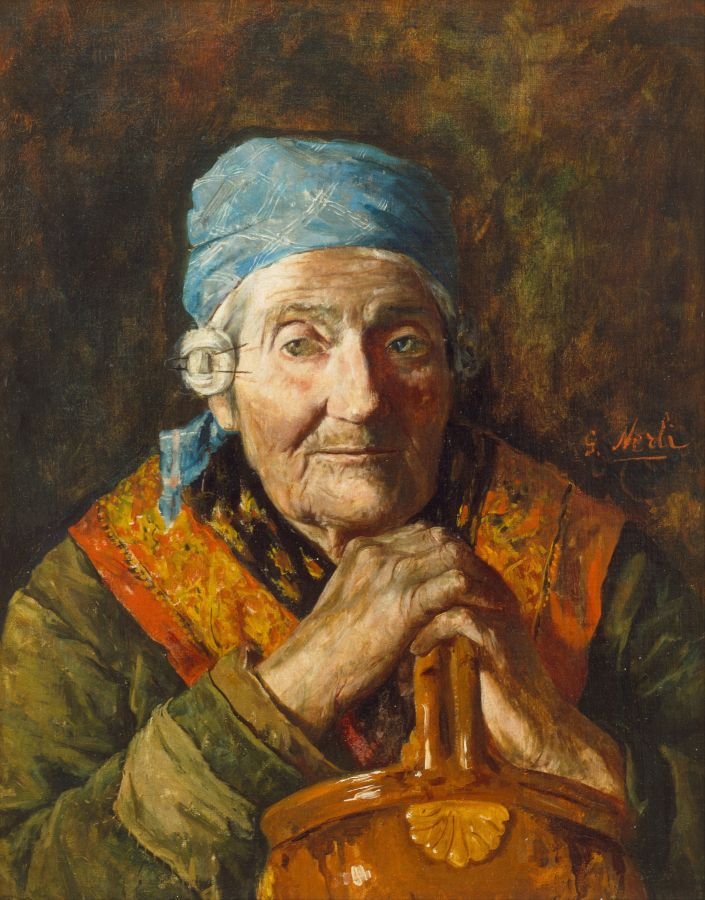
Girolamo Nerli (1860-1926). Public domain
The term 'old age' (as in the painting's title, above) is not much in use these days. There are euphemisms for old age. Elderly. Senior citizen. Golden years. Why is that? What is there about old age that we cannot meet head on? The denial of the aging process is pervasive in popular culture. The semantic avoidance of the word 'old' is symptomatic of an overall negative attitude toward aging.
This denial of old age has implications for all of us. As Simon de Beauvoir wrote, "every single member of the community must know that his future is in question". A plethora of research demonstrates that negative expectations of old age affect our own experience with that time in our lives.
Here is a quote from a study published in Gerontologist: "People with more negative expectations of future health were less likely to survive". And, from The Journals of Gerontology: "Our study suggests that the way in which individuals view their own aging affects their functional health."
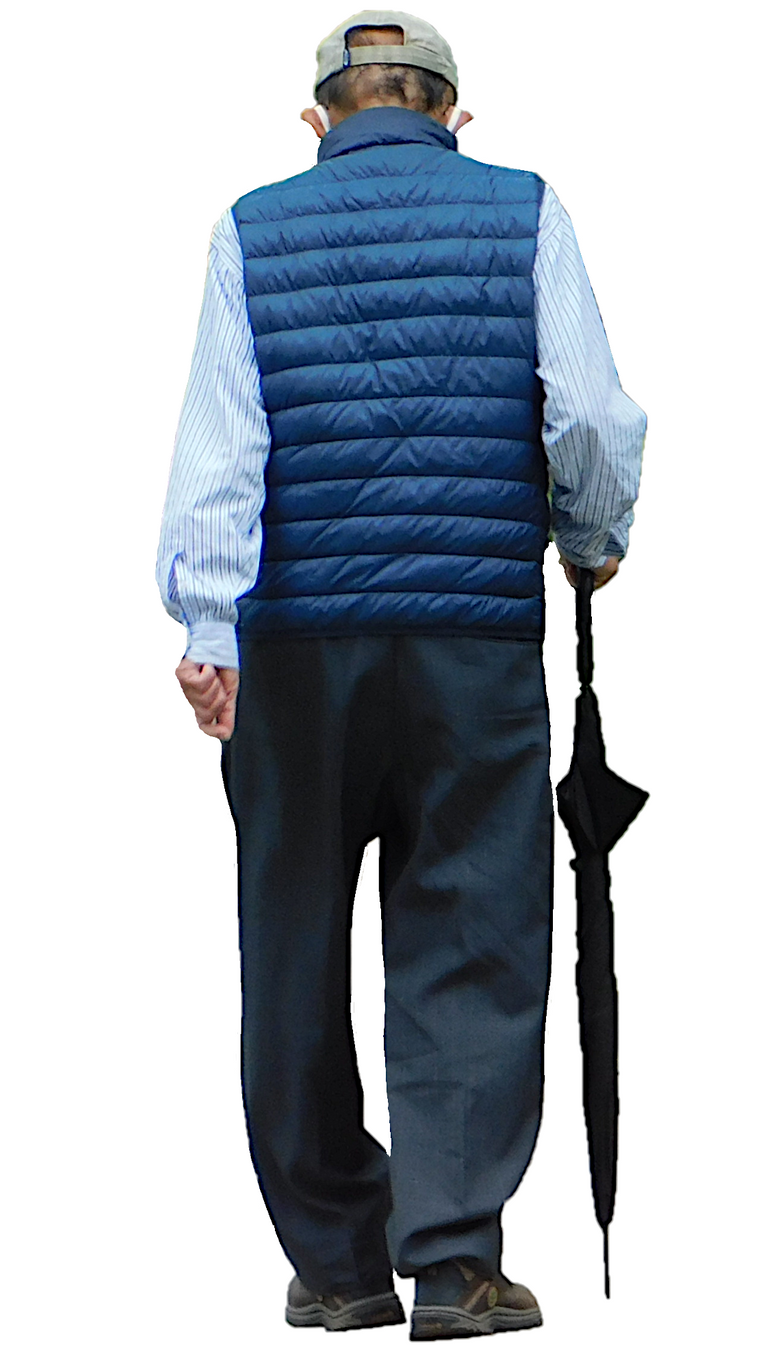
Credit: @agmoore, from the LIL Gallery of Images. Public domain. This image was captured on a Long Island, New York sidewalk.
A 2023 article (from Cal State University, Northridge) discusses a study that explored attitudes toward aging. The authors of this article found, overall (in a survey sample of Southern California residents), a "clear bias against aging and a general fear of getting old." The authors attribute this attitude partly to "Changes in the political, social, and economic landscape [which] altered perceptions about aging and ultimately decreased the status and position of the elderly in society".
Is it true that perceptions of aging have grown more negative over time? Was old age regarded more positively in bygone eras?
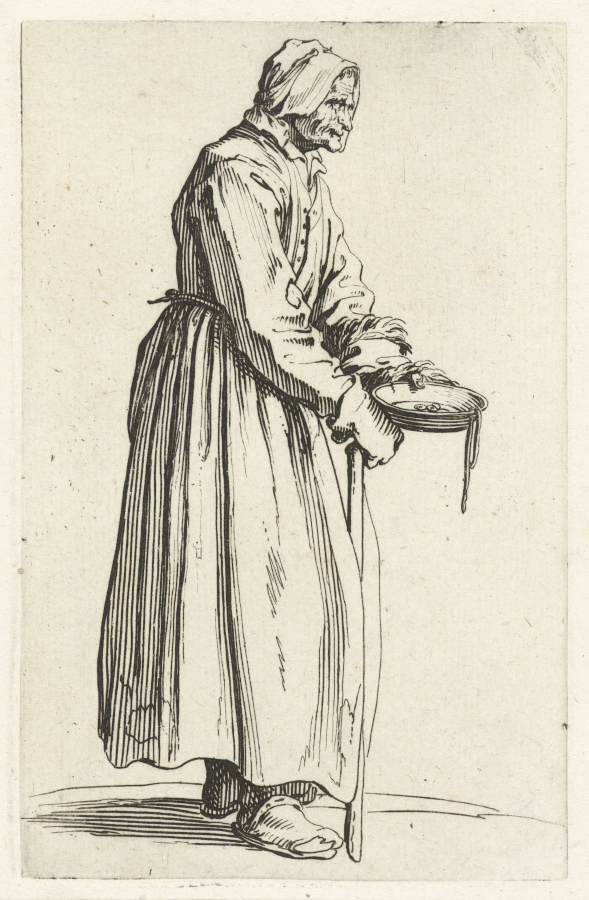
Credit: Jacques Callot (1592-1635). Public domain. The definition of 'old' in the Middle Ages varied. Some defined it as beginning at 40, and some defined it as beginning at 60. The determining factor for deciding whether someone was old or not was generally functional, not chronological age: Can people care for themselves and provide for their economic needs? (Info from the Social History of Medicine)
If we look far back in time, to the Middle Ages, we learn that the past does not offer a rosy picture of old age. In a thesis entitled, Attitudes To Old Age and Ageing in Medieval Society, Josephine Cummins (BDS, MA) describes findings that paint a rather brutal attitude toward the old in that era. Basically, the sense derived from the literature she reviewed was that the old should get out of the way and let the young have their turn.
Cummins contrasts the idealized version of the past that we hold onto today with the reality that old people experienced in the Middle Ages:
The idea of the handsome old man as wise counsellor which is described in "Mum and the Sothsegger, or the terrible veteran of the Chansons de Geste are medieval versions of a golden old age but they are the stuff of fantasy.
Ogier the Dane From the Chansons de Geste

Credit: Pedro Cambra from Barcelona. Used under CC attribution 2.0 generic license. The Chansons de Geste were narrative poems that described the exploits of medieval heroes. Ogier (Holger) the Dane, according to legend, was hundreds of years old and may still be sleeping ;)
Reality for the old in the Middle Ages:
...the elderly were more often despised as meddlers rather than respected as experienced counsellors if they offered advice to their juniors.
and
...The outstanding duty of the elderly person, it seems, was to die at the appropriate time.
There is one aspect of aging that has remained consistent over time, according to Cummins. Comfort in old age is largely dependent on circumstance. If the old can take care of themselves and provide for their own material needs, they are regarded more positively.
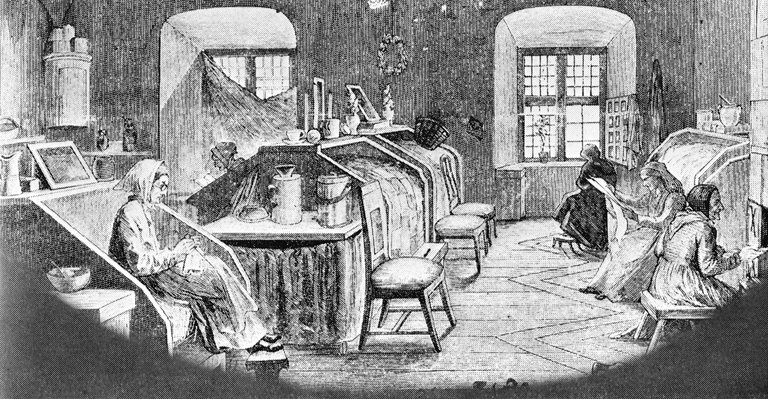
Credit:Julius Ejdestam Public domain. While the institution depicted above existed to meet the needs of the poor, most of the people depicted are elderly. According to the caption under this picture: "The poorhouses in the cities were more orderly than those on the countryside, but on the other hand, the freedom of the inmates was severely restricted." Inmates!
In a book review that appeared in the Journal of Interdisciplinary History, historian Sarah Lloyd bridges the gap between the Middle Ages and Modern times. She reviews the book, The Decline of Life: Old Age in Eighteenth-Century England, by Susan Ottaway. In her review Lloyd describes a society in which there is a "...growing significance of numerical age—usually sixty and older—in defining the elderly, and the effects of economic hardship and bureaucratic elaboration in making contemporaries aware of the aged as a dependent group on the margins of society." In sum, the myth of a "premodern Golden Age of Aging" is debunked by the book and in the review.
The increasing marginalization of the old described by Lloyd is also noted by Cummins in her research. Cummins sees this as a distinction between the way the old were regarded in the Middle Ages and the way they are regarded today. In the present, she asserts, the marginalization is so great that the old are regarded almost as a 'foreign species' (phase from Simon Beauvoir.
Nursing Home, UK, 2007

Paul McIlroy / Nursing Home / CC BY-SA 2.0. The history of this institution perhaps illustrates the marginalization of the elderly as described by Cummins. In 1843 the building was designed to be a poorhouse. In 1909 it was used as a hospital (accommodating people of all ages). In 1988 the building was converted to house the old. It became a nursing home. (Info from the caption under the picture)
Two studies from the Journal of Gerontology look at evolving attitudes toward aging. One study, (Aging Narratives Over 210 Years (1810–2019), focuses on age attitudes toward the aged over a period of 21 decades. This research looked at material published in the U. S. and encompassed "over 150,000 texts from multiple genres..." The study found that "...sentiments towards older adults have become more negative" over time. This trend was noted in nonfiction literature. In fiction, there was an opposite trend. There, older people were portrayed "...positively through romantic courtship and war heroism". Another article published in Gerontology (Attitudes Toward Aging: A Glance Back at Research Developments Over the Past 75 Years) looked at 75 years of the journal's publications, (1946-2020). In their conclusion, the authors emphasize the importance of understanding attitudes toward aging. "Attitudes or perceptions toward aging... have real-life consequences, including their impacts on how older adults are received and treated by others." A Finnish Woman Rides a Modified Tricycle Not only do negative stereotypes about aging influence the way others regard and treat the old, but these stereotypes are often internalized by individuals as they age. The stereotypes can become a self-fulfilling prophecy. Research in the last 30 years illustrates that attitudes towards ones self as aging occurs, "shape physical health, cognitive functioning, and subjective well-being, through pathways such as internalization of negative attitudes (e.g., illness attributions), and expectations..." An article in Nursing Ethics (Dignity and attitudes to aging: A cross-sectional study of older adults, 2021) focuses on how attitudes affect the physical well being of the old. This study was carried out in the Czech Republic. It evaluated responses from 233 subjects who lived in communal settings (institutions) and 237 who lived at home. The institutionalized residents had a more negative attitude toward aging, and this correlated with gender and a sense of dignity. Women scored more negatively in this group than men did. Nursing Home in the Czech Republic Among home-dwelling subjects, negative attitudes to aging were found in older adults with lower levels of education. Also, living alone correlated with more negative aging attitudes. The researchers tie their conclusions to the real-life consequences of negative expectations and perceptions of aging among the old: "these can impact on the quality of life, satisfaction with one’s life, stress response, coping strategies, cognitive functions, for example, verbal fluency and memory, and healthy living behaviors." A more global perspective toward aging was offered by a study published in the journal Health and Quality of Life Outcomes 2013, Attitudes to aging mediate the relationship between older peoples’ subjective health and quality of life in 20 countries. The countries surveyed in this study did not include any from Africa. Surveyed were 14 countries: Australia; France; Switzerland; England; Scotland; USA; Israel; Spain; Japan; Turkey; Lithuania; Czech Republic; Budapest; Canada; Norway; Sweden; Denmark; Germany; Brazil; Uruguay. The results of the study were consistent across all the surveyed populations. Health satisfaction, physical, psychological, social and environmental quality were affected by survey respondents' attitude toward aging. Community in Ngoro Cameroon Celebrate Life of a Deceased Elder Africa However, several reports I consulted suggest that the strong cultural support structure of the old in many African nations is eroding. The European Journal of Accounting Auditing reported: "However, changes in the structure of African society occasioned by the introduction of formal education by the West neutralized this traditional system of caring for older people as they are now facing many challenges." Conclusion From this disparity in health parameters for the young and the old, I began my investigation. I did expect the outcome I found (which of course tends to taint the results), but still the journey to that outcome was interesting. Thank you for reading my blog. A long one! I hope the information prompts some self reflection on how our attitudes toward aging can affect our own lives. Health and peace to all.
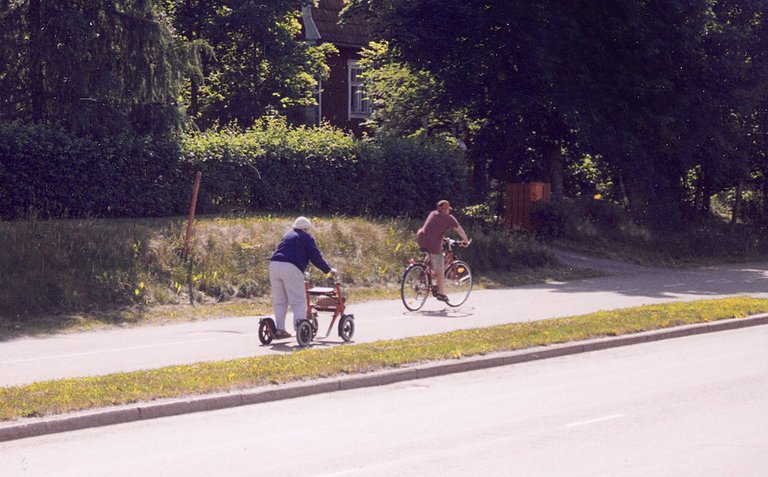
Credit Arquus. Used under Creative Commons Attribution-Share Alike 4.0 International license.
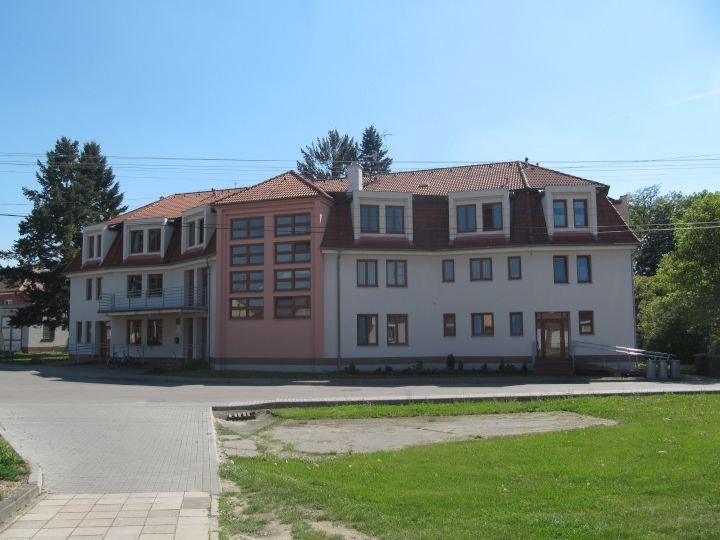
Credit: palickap. Used under CC Attribution 3.0 Unported license.

Credit:MBATAKA used under Creative Commons Attribution-Share Alike 4.0 International license.
Africa is not a monolith. I would need a separate paper to begin to responsibly handle the subject of aging in the varied cultures represented on the continent. Not only is Africa generally regarded (in the literature) as two distinct areas-- Sub-Saharan and North Africa, but research on this subject is relatively scant. The cultures on the continent are evolving rapidly. Traditionally, the old have been regarded with respect and care of the elderly was largely a family/kinship responsibility.
I began this blog when I learned that the usual parameters for blood pressure, waist circumference and BMI may be different for the old than they are for the young. Getting this information took some hunting, and many doctors don't seem to be aware of it, generally.
https://pubmed.ncbi.nlm.nih.gov/11639284/
https://medlineplus.gov/ency/article/003998.htm
https://www.ncbi.nlm.nih.gov/books/NBK563107/
https://www.historic-uk.com/HistoryUK/HistoryofBritain/Victorian-Workhouse/
https://academic.oup.com/shm
http://www.eajournals.org/wp-content/uploads/The-Changing-Privileges-and-Challenges-of-Older-People-in-Contemporary-African-Society.pdf
https://www.afro.who.int/health-topics/ageing
https://www.ncbi.nlm.nih.gov/pmc/articles/PMC9298985/
https://www.ncbi.nlm.nih.gov/books/NBK20296/
https://geography.name/age-and-aging/
https://academic.oup.com/psychsocgerontology/article/57/5/P409/609413
https://www.ageing.ox.ac.uk/blog/the-demonization-of-older-people
https://www.ncbi.nlm.nih.gov/pmc/articles/PMC3485367/
https://implicit.harvard.edu/implicit/takeatest.html
https://www.ncbi.nlm.nih.gov/pmc/articles/PMC5881761/
https://www.scirp.org/journal/paperinformation.aspx?paperid=78445
https://muse.jhu.edu/article/183831)
https://medlineplus.gov/ency/article/003998.htm
https://www.nature.com/articles/s41598-023-29586-w
https://www.agingcare.com/articles/high-blood-pressure-in-seniors-108019.htm
http://www.eajournals.org/wp-content/uploads/The-Changing-Privileges-and-Challenges-of-Older-People-in-Contemporary-African-Society.pdf)
https://link.springer.com/article/10.1186/1477-7525-11-146
https://journals.sagepub.com/doi/10.1177/09697330211057223
https://academic.oup.com/psychsocgerontology/article/75/6/1125/5850305
https://academic.oup.com/psychsocgerontology/article/76/9/1799/6029775
https://aeon.co/essays/simone-de-beauvoir-on-facing-old-age-and-avoiding-bad-faith
https://press.uchicago.edu/ucp/books/author/L/S/au69430762.html
https://www.ancientpages.com/2016/05/08/legend-of-sleeping-hero-holger-danske-viking-warrior-who-never-died/
https://en.wikipedia.org/wiki/Chanson_de_geste
https://theses.gla.ac.uk/2542/1/2000cumminsphd.pdf
That was my question too as I was reading, and I largely agree with your conclusions—though I find that you conflate attitudes toward aging with attitudes toward the aged. My impression from everything I've read, is that attitudes toward the aged were mixed but leaning toward the negative, but attitudes toward aging were steadfastly negative. These negative attitudes were enshrined in myths, and today in religion, and often take the form of a quest for immortality or even (usually in religion and spirituality) taking it for granted as an ontological fact given to us for free (no quest required).
That ageism is still a thing was made starkly clear to me during this whole pandemic situation, where many people online were calling for governments to let the old die, citing Nature or Money or some such.
Was watching an interview with Michael Shermer today and his guest, Michael Shellenberger, had a skull—a memento mori—on his desk behind him.
I'm interested in this aging stuff and our attitudes toward it and how religions mask them by fake-satisfying our natural longing for immortality, so thanks for the article!
Hello @alexanderalexis,
As always you make some good points.
Beauvoir writes:
I think people fear aging, but they don't necessarily fear the old. They fear growing old and being among the dismissed. They fear the inevitability of death, and old age is on the doorstep of death (but aren't we always on the doorstep of death?). It's not just death, it's death taking over. They'd rather take a risk and die in a ski accident, or commit suicide than let death absorb them.
I think it's partly because aging is inexorable that people dread it, and fight it.
Not their finest moment, but many of them stand by their statements today.
What's that saying? There are no atheists in a foxhole? I think without death looming religion would be hard to sell to most people.
Thanks for stopping by. Hope life is treating you well.
I was particularly interested in the study that you mentioned, which found that negative attitudes towards aging can have a negative impact on physical health, cognitive functioning, and subjective well-being. This is something that I had not considered before, but it makes a lot of sense. If we believe that aging is a negative thing, then we are more likely to focus on the negative aspects of aging and to neglect our health and well-being.
Thank you for commenting, @malos10.
I think you are absolutely right. Plus, depression is bad for the health at any age, and being depressed about being old can't be a good thing.
Thanks for your contribution to the STEMsocial community. Feel free to join us on discord to get to know the rest of us!
Please consider delegating to the @stemsocial account (85% of the curation rewards are returned).
Thanks for including @stemsocial as a beneficiary, which gives you stronger support.
That's an interesting read.
I would also be most interested in the reversed: Attitudes of the aged towards the young
Thank you, @mathowl.
I don't think anyone bothered to ask them. 😄 I'd be interested to know also. Next blog.😁
Your support is much appreciated, @stemsocial
LOL
Minutes ago, I was telling a real estate agent how hard it is to reason with the elderly.
So set it their ways.
So resistant to change.
But the young... oh, don't get me started!
Their lack of respect for the wisdom of the elders!
Anyone who made it past age 80 must have learned a few things.
Are these things still relevant today? Usually, yes, they are.
When a person does not expect anything from someone and that person does not fulfill that expectation, then the person feels very sad. If a person wants to live his life in a good way, then he should never expect anything from him and should make his life successful by working hard, then only then a person can live a good and prosperous life.
If we don't expect things from people, they can never disappoint us. This is true. Thanks for stopping by, @djbravo
Most welcome dear.
What a wonderful and well written post. I absolute loved it. Congratulations, @agmoore
Thank you, @freakshow90!
No need to thanks, mate! Great work of yours @agmoore
This is a very interesting post . Aging is not a negative situation . We should let our our young ones know this. The elderly are being despise in this present time. My kids are really pleading with me not to age. Aging is a positive situation . We should care and respect old people.
You should tell them you'll do your best😇. Sometimes things are out of our control, aren't they? We do our best and accept the outcome.
Thanks for stopping by, @ladyfoth.
lol , I've told them that aging is a blessing but I will try my best .
https://leofinance.io/threads/ladyfoth/re-ladyfoth-1s4j8fyf
The rewards earned on this comment will go directly to the people ( ladyfoth ) sharing the post on LeoThreads,LikeTu,dBuzz.
https://twitter.com/LovingGirlHive/status/1677611590097711104
I believe that at any age, our life experience is shaped by our attitudes and expectations. A 71-year-old friend said to me last week that everyone except herself knew that she was 71. She's never ill, does African dancing twice a week, swims weekly, has been on four holidays already this year and is off to Valencia next week. She's always been a busy bee and expects to die dancing.
My father used to tell us that sickness was a state of mind. 'Sick or not sick, everyone works today' he would say. To this day my two siblings and I, in our late 50s and 60s, have perfect health, have neither a doctor nor health insurance and we expect to die in the best of health!
😁
That's the only way to go.
Great insights on aging, and attitudes toward aging - and great job of pulling together so many sources! One in particular led me down the Rabbit Hole. Of course I commented on the wrong post, so I'm copy/pasting the comment here:
Ooh what a great legend! God tells the sleeping warrior "It was only a dream; go back to sleep," But if danger ever does come, then old Holger Danske will arise, and this is why I read books. :)
Not gonna do the block-quote thing, not with so many paragraphs, but this!
Written by – A. Sutherland - AncientPages.com Senior Staff Writer
Updated on March 1, 2023
https://www.ancientpages.com/2016/05/08/legend-of-sleeping-hero-holger-danske-viking-warrior-who-never-died/